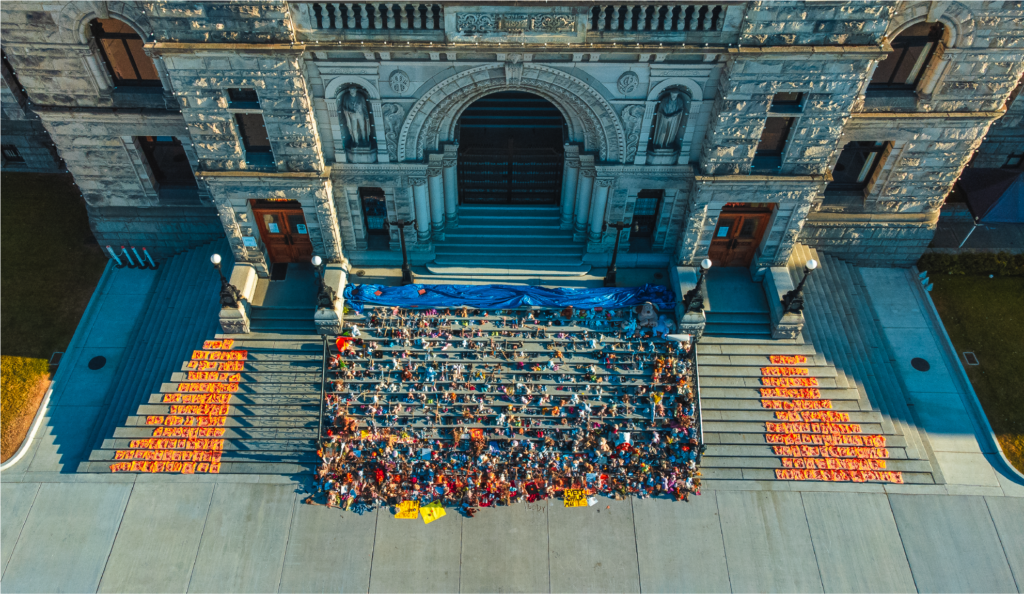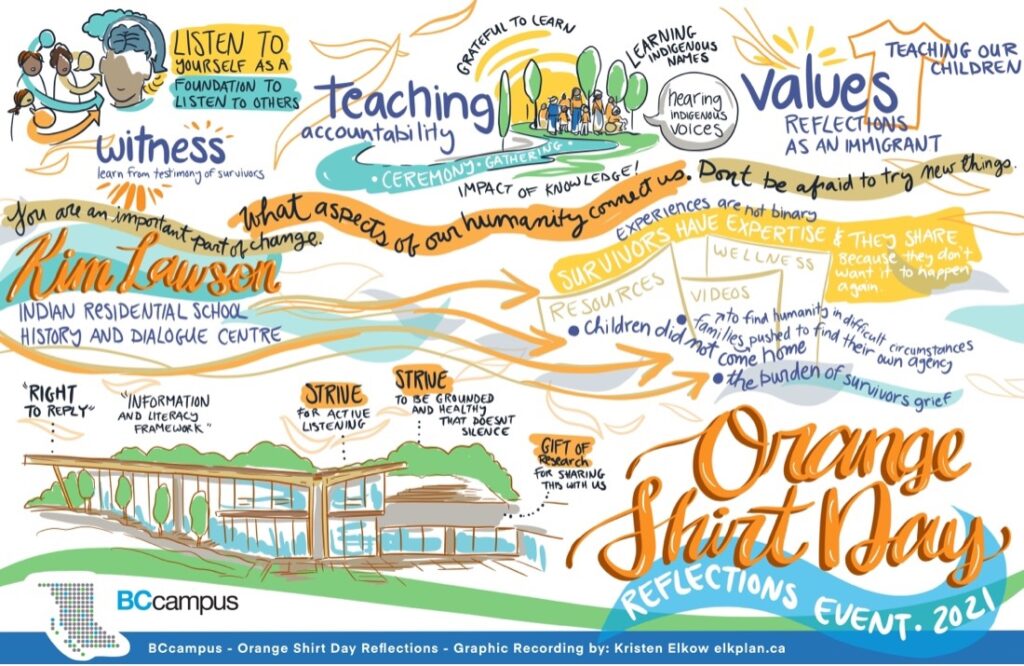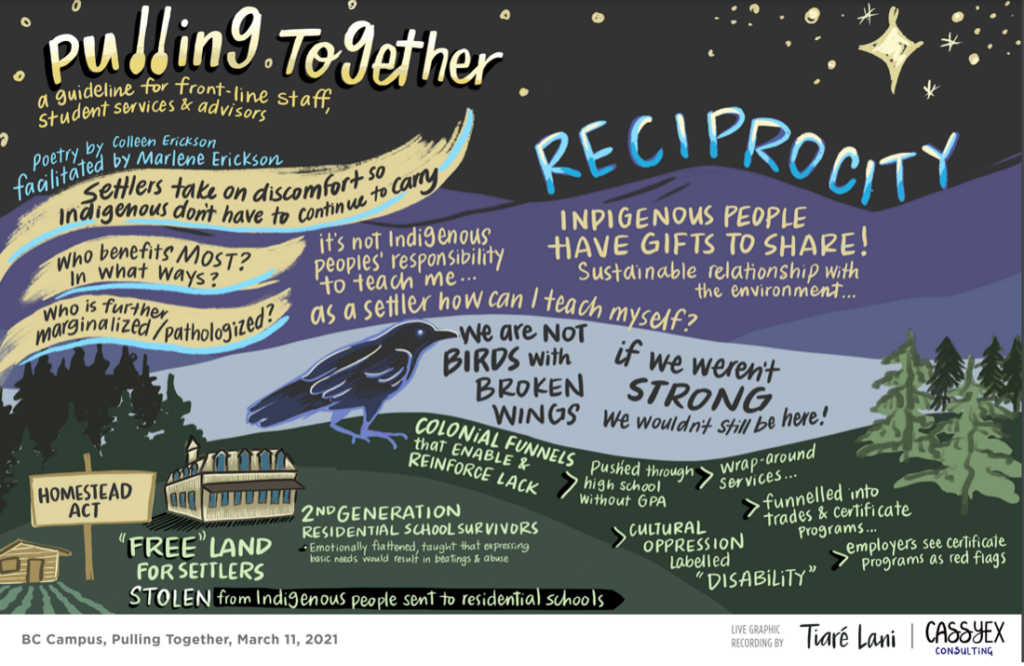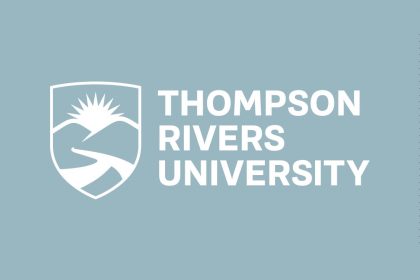Content warning: This section includes content about residential schools. If you or someone you know needs support, please reach out to the Indian Residential School Survivors Society.
Land Acknowledgement: At BCcampus we are grateful and honoured to work on the traditional, unceded, and occupied territories of the səl̓ilwətaɁɬ təməxʷ (Tsleil-Waututh), Skwxwú7meshulh Temíx̱w (Squamish), xʷməθkʷəy̓əm (Musqueam), and W̱SÁNEĆ (Saanich) Peoples and the Esquimalt and Songhees Nations of the lək̓ʷəŋən (lekwungen) Peoples. Through our work, we are grateful to build relationships with people from across B.C. and are thankful to all the Indigenous educators who have generously worked with us and provided us with teachings. We would like to acknowledge survivors of the residential school system and their loved ones as well as the communities where the unmarked graves of children have been discovered. Our hearts are with the survivors, family members, and communities as we mourn the loss of their children and stolen generations. We are dedicated to supporting reconciliation and decolonization as we advocate for systemic change in the post-secondary environment of B.C. We are here to support individuals who are beginning a journey of unlearning and learning as well as those who have already been engaged in the work of decolonizing their own minds and our post-secondary system.
Post by
Gabrielle Lamontagne (she/her) is the coordinator of collaborative projects and Indigenization at BCcampus. She is a Métis woman originally from Winnipeg, Manitoba, who has a background in archival research and as a librarian.
Becca Shortt (she/her) is the coordinator for the Learning & Teaching department at BCcampus. She is a Canadian-born settler who was raised on Treaty 6 territory and now gratefully lives on lək̓ʷəŋən territory. She has a background in Indigenous/non-Indigenous relationship building and community engagement.
“Education is what got us into this mess — the use of education at least in terms of residential schools — but education is the key to reconciliation. We need to look at the way we are educating children. That’s why we say that this is not an Aboriginal problem. It’s a Canadian problem.” — Justice Murray Sinclair
Intro
Earlier this year the remains of 215 children were uncovered at Kamloops Indian Residential School using ground-penetrating radar. This information has come after years of Tk’emlups te Secwépemc First Nation members giving firsthand accounts from lived experience or from stories told by family members about the graves and cemeteries associated with the schools. The total is estimated to be over 6000 children at the time this article was written, but the story has lost traction in the media. Further investigations fall under the Truth and Reconciliation Commission’s Calls to Action 71–76: Missing Children and Burial Information. Consider Colin Smith’s image of the memorial that community members created at the legislature buildings on lək̓ʷəŋən territory (Victoria, B.C.). The memorial was on display from May until October 2021, after which it was quietly taken down. There is no plaque or memorial put in place as remembrance. This highlights the issue suddenly being “removed” or “disappearing” from public view. We want to continue the conversation.

As an organization and as a province, we need to continue to learn and take action toward reconciliation every day, not only when events are sensationalized in the media. This is especially important in the education sector, where we have a responsibility to influence social change using our influence and resources. We have power as educational organizations and can work to fulfill the Calls to Action 62–65: Education for Reconciliation.
Internal Learning at BCcampus
“We are dedicated to supporting reconciliation and decolonization as we advocate for systemic change in the post-secondary environment of B.C.” — BCcampus
At BCcampus we work closely with B.C. public post-secondary intuitions. We recognize the responsibility we have in working toward reconciliation and decolonization, particularly in the education sector. We need to do a lot of learning to be able to take meaningful action that leads to systematic change. Here are some of the learning opportunities we have led at BCcampus. We invite you to do these things with your colleagues or as self-learning.
- Participate in post–Orange Shirt Day reflection with Kim Lawson from UBC’s Indian Residential School History and Dialogue Centre.
- Hold Indigenous learning circles and ask questions like “Where does your work fit into the 92 Calls to Action?”
- Host annual book clubs and highlight Indigenous authors.
- Thomas King’s Truth About Stories
- Marilyn Dumont’s Pemmican Eaters
- Schedule Indigenous cafés where people can drop in to informally chat about their favorite Indigenous art pieces or new reading materials or share First Nation, Métis, and Inuit events in their area.
- Work through the Decolonize First workbook by Ta7talíya Michelle Nahanee.
- Host an annual Indigenous speaker series to highlight Indigenous businesses and educators.

Learning Together as a Community
“We are here to support individuals who are beginning a journey of unlearning and learning as well as those who have already been engaged in the work of decolonizing their own minds and our post-secondary system.” —BCcampus
We are here to support institutions as they adopt, adapt, and evolve their teaching and learning practices to create a better experience for students. Reconciliation and decolonization must be incorporated into the growth and development of teaching practices and pedagogy. We invite everyone to join us at our events to learn more about reconciliation and decolonization practices.
- Read the Pulling Together Guides.
- Register for the Pulling Together Guide Series.
- Teacher and instructor sessions will be held in Spring 2022.
- Register for a FLO Course on Indigenizing your curriculum and territorial acknowledgments. (Subscribe to our newsletter to learn about upcoming offerings.)

Resources We Love
Learning happens both in the community and individually. We encourage everyone to incorporate learning about Indigenous peoples, cultures, histories, and experiences into your everyday lives. These are some resources we have enjoyed and recommend:
Leva Lee has been listening to the podcast The Secret Life of Canada.
Jonathan Orr suggests that “reading and resources are great, but take every opportunity you can to actually go and visit these places and speak with Indigenous folks.” In the meantime, he recommends:
- Short film: Surviving the Horror of Residential Schools by Skateboarding
- Spotify playlist: Native North America (Vol. 1) Aboriginal Folk, Rock, and Country 19661985
- Instagram follows: @riseindigenous, @wetsuweten_checkpoint (specifically their post 10 Principles of Reconciliation), and @seedingsovereignty
- Blog post: How We Make Family: Making Decolonization Personal
Gabrielle Lamontagne suggests checking out a local museum. She recently visited the Royal Alberta Museum.
Carolee Clyne shares this resource from UBC: “How Do You Talk About Indigenous Issues in the Classroom?”
Becca Shortt enjoys the N’we Jinan artists and suggests listening to them on Spotify.
Michelle Glubke recommends using the wellness wheel designed by Jewell Gillies for the BCcampus Mental Health and Wellness project. It is an Indigenous perspective on wellness that looks at the whole person (faculty, staff, student). Also, the last page of the BCcampus Open Professional Learning Resources: Audience Profiles document includes a table called Levels of Indigenizing: Barriers, Challenges and Fragilities with examples of how fear and resistance show up in dialogue.
Tracy Roberts loves the soaps and bath bombs from Sisters Sage and the earrings from Copper Canoe Woman.
Erin Beattie loves the book subscription boxes from Ravens Reads.
Endless Learning Opportunities
Many resources are available online to continue your learning. The Indian Residential School History and Dialogue Centre has made videos from Orange Shirt Day 2021 available. They have also put together an extensive list of resources, including the following:
- Watch and listen to National Day for Truth and Reconciliation on CBC
- Witness Blanket website
- Challenging Perspective on Wellbeing – The Impact of Disconnectedness
- Gord Downie and Chanie Wenjack Fund Discussion
- Challenging Ideology: Looking at Historical Museum Practices Through an Indigenous Lens
Decolonization and reconciliation are not quick processes. They require thoughtful long-term responsibility and accountability to mend and re-build from the effects of atrocities and genocide over many generations. Within the education sector we must continue the conversation about the multigenerational impacts of residential schools. It is our responsibility to never forget so we can move forward in a good way, heal together, and create systemic change that builds safe and equitable learning environments for all students. Every child matters.
